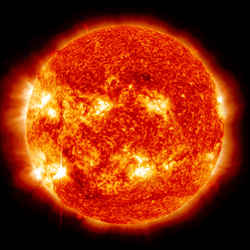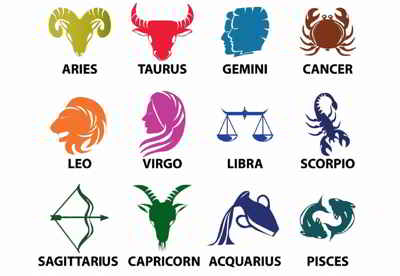Western Astrology: Classical Planets: Sun
The Sun is the planetary ruler of Leo, the sign that governs th 5th house in the natural zodiac and is exalted in Aries.

The seven classical planets are those easily seen with the naked eye, and were thus known to ancient astrologers. They are the Sun, Moon, Mercury, Venus, Mars, Jupiter and Saturn. Sometimes, the Sun and Moon were referred to as "the lights" or the "luminaries".
Our sun sign is our main sign. It is our life force.It indicates what kind of person we will become. We circle the sun every 12 months. There are 12 zodiac signs or sections in the sky that the sun crosses through out a year. The Sun is God the father- creator of heaven and Earth in Greek mythology. The sun watches over our health and well being. The Sun is the star at the center of the Solar System and is by far the most important source of energy for life on Earth. The sun is masculine energy and rules Leo.
Distance to Earth: 92,960,000 miles
Surface temperature: 5,778 K
Mass: 1.989E30 kg
Radius: 695,800 km (1 R☉)
Magnitude: -26.74
Orbits: Galactic Center
Although the sun isn't a planet, its placement in your birth chart and present location in the zodiac are considered to have significant meaning. The sun gives life to everything on the planet. Your natal birth sign is based upon the placement of the sun in a particular zodiac constellation, at the moment you were born. The sign brings light to who you are deep down. It governs the ego, and illuminates your nature and character. The sun is also associated with your father and the way you relate to men. Any sign may have a significant placement of the sun in a particular chart. When the Sun is placed favorably, you may feel more confident and positive, though you may also find that you see flaws and imperfections. The Sun rules the Leo Zodiac Astrology Sign. Leo governs the 5th house in the natural zodiac.
Western Astrology: Classical Planets: Sun
Sun |
|

The Sun, a luminary. In Greek mythology, the Sun was represented by the Titans Hyperion and Helios (Roman Sol, and later by Apollo, the god of light). The Sun is the star at the center of our solar system, around which the Earth and other planets revolve and provides us with heat and light.
The Sun's daily motion is roughly of one degree. In astrology, as viewed from the Earth, neither the Sun nor the Moon retrogrades. The luminaries, i.e. the Sun and the Moon, are the only "planets" which never move backwards on the Zodiac.
The arc that the Sun travels in every year, rising and setting in a slightly different place each day, is therefore in reality a reflection of the Earth's own orbit around the Sun. This arc is larger the farther north or south from the equator latitude, giving a more extreme difference between day and night and between seasons during the year.
Distance to Earth: 92,960,000 miles
Surface temperature: 5,778 K
Mass: 1.989E30 kg
Radius: 695,800 km (1 R?#732;‰)
Magnitude: -26.74
Orbits: Galactic Center ; The Sun takes approximately 365 days to travel through the Zodiac, and spends 30 days in each sign. (There are 30 degrees
in a sign).
The Sun's position on a person's birthday therefore determines what is usually called his or her "sun" sign.
However, the sun sign allotment varies between Western (sign change around 22-23 of every month) and Hindu astrology (sign change around 14-15 of every
month) due the different systems of planetary calculations, following the tropical and sidereal definitions respectively.
Astrologically, the Sun is a star of warmth, life, and light. Therefore, he emphasizes courage, loyalty, nobleness and generosity, but also pride,
irascibility, and self-centerness. The Sun is usually thought to represent the conscious ego, the self and its expression, personal power, pride and
authority, leadership qualities and the principles of creativity, spontaneity, health and vitality, the sum of which is named the "life force".
One of the first recorded references to Sun worship is from the Mesopotamian Religion and described in the Epic of Gilgamesh. The 1st-century poet
Marcus Manilius in his epic, 8000-verse poem, Astronomica, described the Sun, or Sol, as benign and favorable. In medicine, the Sun is associated
with the heart, circulatory system, and the thymus. In Ayurveda, it rules over life-force, governs bile temperament (pitta), stomach, bones
and eyes. In modern astrology, the Sun is the primary native ruler of the fifth house.
Rules Day of the Week: Sunday
The Sun rule Sunday. "But the child born on the Sabbath Day is fair and wise and good and gay" might refer to the magnanimous Sun nature. The Sun is not an actual planet, but it is the biggest luminary body in the sky that has a tremendous effect on all of us. And, you can imagine, those that are blessed to be born on a Sunday are among the sweetest people to know. They are wise, and good, and whenever they enter a room they bring the joy of the Sun with them.
The Sun is associated with Sunday. Dante Alighieri associated the Sun with the liberal art of music. In Chinese astrology, the Sun represents Yang, the active, assertive masculine life principle.





